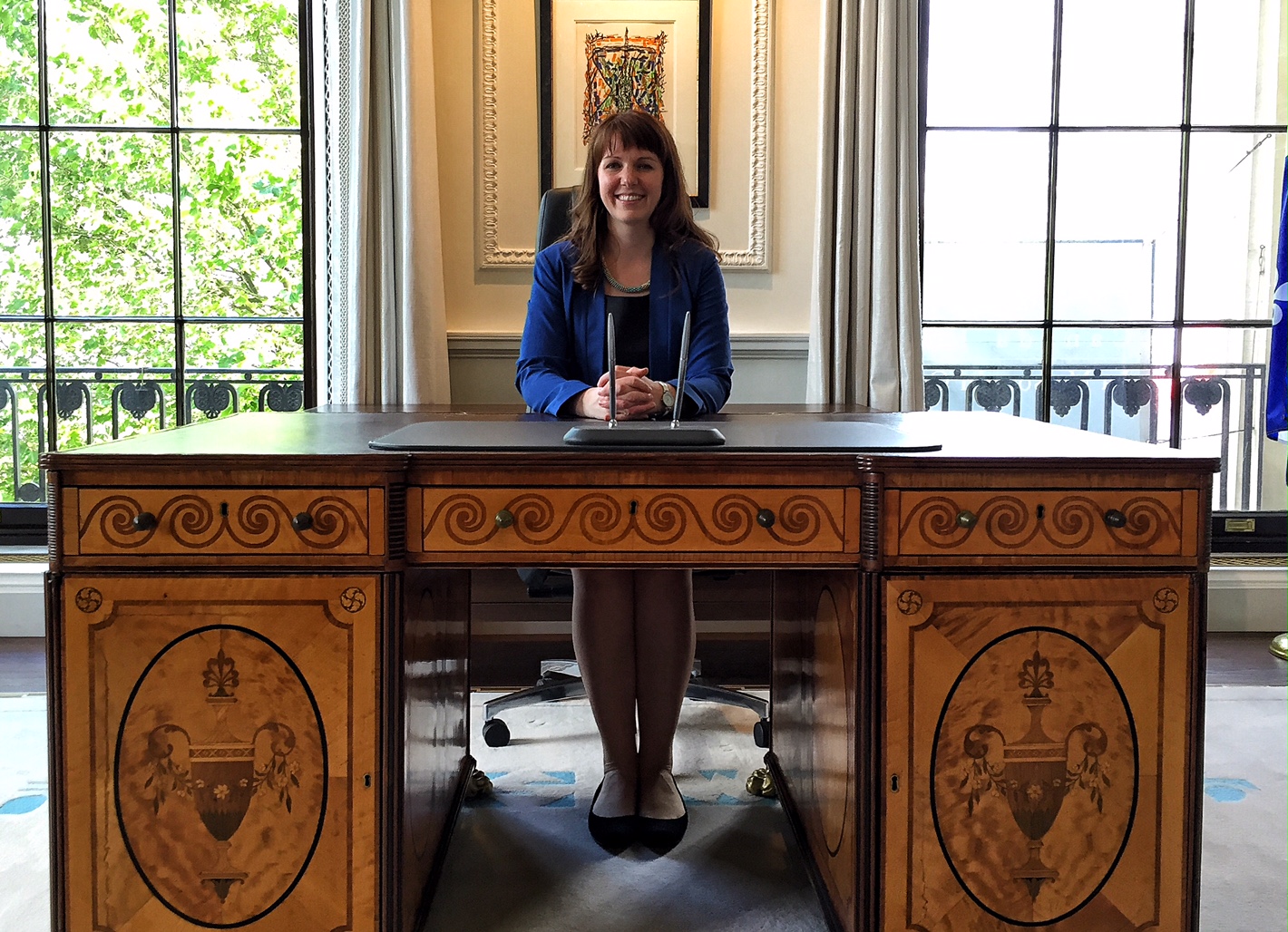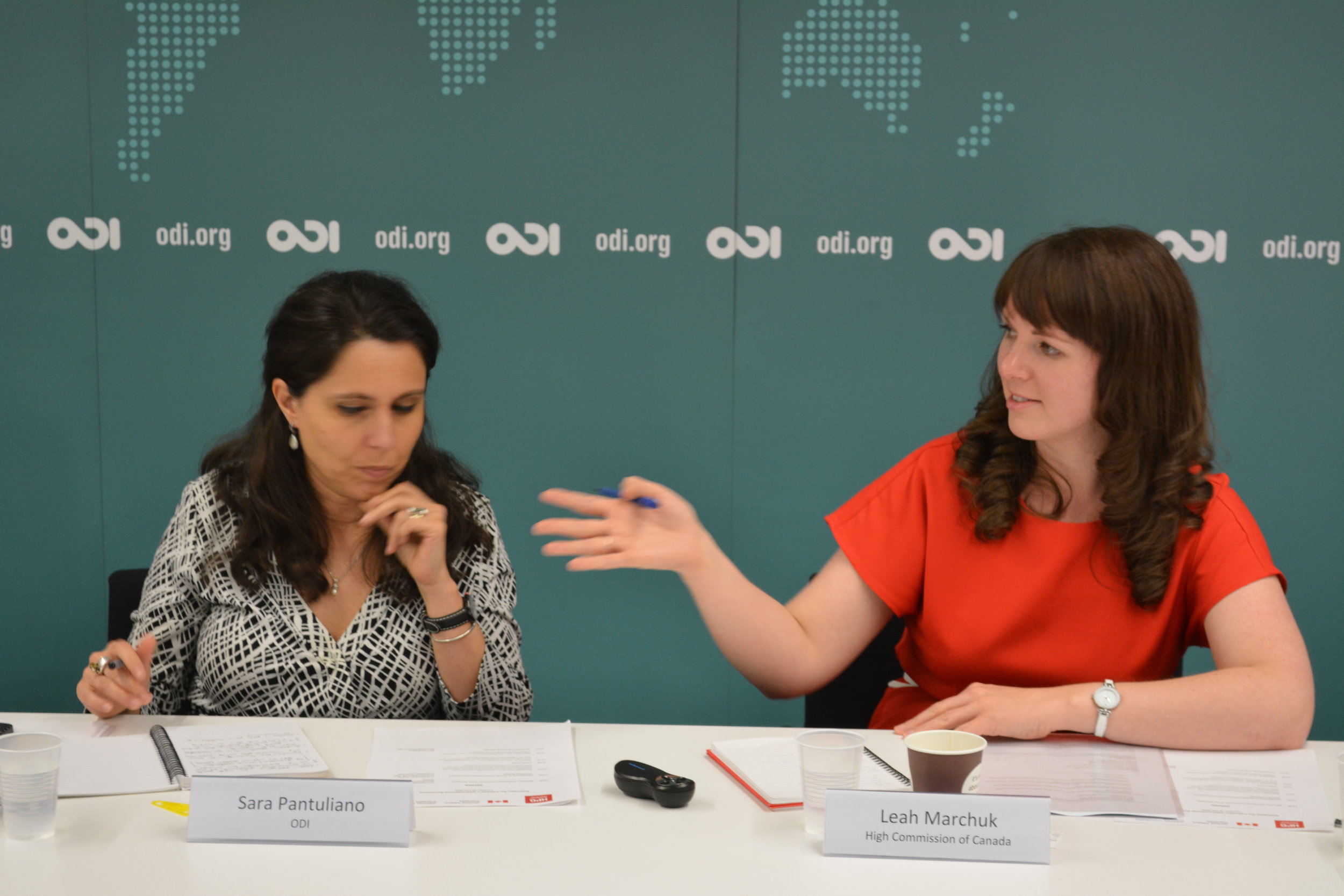Leah Marchuk
/Diplomat | Canadian High Commission to the United Kingdom
Education: BA in International Relations and Affairs at The University of British Columbia | MSc Candidate in International Strategy and Diplomacy at The London School of Economics
Previously worked at: Canadian Department of National Defence | Canadian International Development Agency | The GLOBE Foundation | Global Affairs Canada
Find Leah Online: Twitter | LinkedIn
Inspired by Leah’s interview? Take a look at the career opportunities and internships at: Global Affairs Canada | Canadian Department of National Defence
Exclusive interview with Aisha Babalakin on November 25, 2016
Does the Canadian High Commission have any internship opportunities for Canadian students in the United Kingdom?
We do hire interns from time to time. The Government’s policy is that we only offer paid internships. Internship opportunities are posted on the High Commission website.
Do you have to speak both French and English to work at the Canadian High Commission?
You have to speak both French and English to be a Canadian diplomat, but that requirement doesn’t apply to internships. It is always an asset to speak both languages when working for the Canadian Government because they are both official languages. The Canadian High Commission to the United Kingdom largely operates in English since the UK is an Anglophone country, but French language skills would give you a leg up in any application.
Do you speak any other languages?
No, just French and English for now. In the Canadian system, there’s a lot of interest in hiring candidates who have language skills already. If you do not have language skills, there are opportunities to learn languages on the job. We have access to online learning tools – you can learn a language on the side if you would like. Sometimes, if you are chosen for a posting in a foreign country, the Foreign Service will provide language training before you deploy. Canadian diplomats sometimes do up to two years of language training full-time before heading out on a posting.
What skills do you think are most important for your position in the Canadian Foreign Service?
First of all, I think being flexible is very important for a career in diplomacy. The job requires living in different parts of the world and adapting to different environments. Most Canadian diplomatic postings last anywhere from one to five years, so diplomats assume many different roles throughout their careers. Diplomats, like all public servants, also need to deliver the policy priorities of the current Government, and be prepared for political priorities to change and evolve throughout their career.
Good judgment is also crucial to a career in diplomacy – there’s a lot of thinking on your feet. You don’t always have the opportunity to ask for advice or check with a superior to verify how you should act in a given situation. You have to use your own judgment. For instance, if you’re negotiating a resolution at the United Nations, you may start with a set of instructions about specific language or policy that your delegation wants in the resolution, but you have to use your own judgment to figure out how to be successful during the negotiation process. You have to be prepared to think things through by yourself.
Teamwork is also important because diplomacy is a team sport. It’s very rare to undertake any policy initiative entirely by yourself. Usually, the major successes have involved dozens, if not hundreds of people – and usually beyond your own government. You have to be prepared to work with and support others and look for what others can contribute.
You studied International Relations at The University of British Columbia. Did you always know that you wanted to become a diplomat?
I actually had the ambition to be a diplomat when I was a teenager. It was something that interested me from a fairly young age. That’s not necessarily the case for most diplomats – some people figure it out later in life. In fact, not everyone I work with has a background in international relations – one of my colleagues used to be a physiotherapist, and another used to be an art historian. It’s not always a linear track; the skills that I mentioned before are actually more important than background knowledge in foreign policy, because you learn a lot on the job. Having the right personality and the right skill set is essential.
That said, I was always really attracted to the world of foreign policy. I always believed that the career was an opportunity to make a difference, and I really wanted to make the world a better place. That is what brings me into the office every morning, and it is why I continue to serve as a diplomat.
Canada also has a long and consistent history of championing human rights internationally, and that is just one of the reasons that I’m proud to represent Canada. A lot of assignments that I have chosen in my career have had a human rights focus because I truly believe in Canada’s ability to make an impact, and the importance of Canada’s voice in international human rights discussions.
Why do you believe that Gender Equality should be a priority for the Canadian Government?
When Prime Minister Trudeau appointed a gender – balanced Cabinet, he was asked why, and he said “Because it’s 2015”:
I think that is telling of general attitudes towards gender equality in Canada, and this echoes across party lines. There is recognition that men and women need to be seen as equal participants in politics, diplomacy, and business. The Government knows it has a role to play, and it wants to lead by example.


Tell us about your MSc in International Strategy and Diplomacy at The London School of Economics
The one – year course is designed for people who already have experience working in foreign policy. Most people in the programme have at least 7 – 10 years of work experience. Some of us work for governments, but there are also a number of people who work in the private sector or with NGOs. It’s nice that there’s professional diversity within the group, and we also have students from all around the world. It creates a rich atmosphere for discussing international issues.
The programme is technically full-time, but the classes are structured in such a way that people can work while at school. The course has four concentrated weeks, with classes all week long, 9-5. For the rest of the year, there are evening classes and some weekend classes. I understand that it is a similar number of classroom hours you would have in any Master’s programme. Each lecture is from a different foreign policy expert or practitioner, which provides real-world experience. The learning is meant to be very applicable to a policy setting, going beyond a traditional academic focus. I think it’s an excellent program for people in the foreign policy field.
Did you move to London for the course, or were you already working for the Canadian High Commission in the United Kingdom before you applied?
I was already working for the High Commission, but I had my eye on the course even before I moved to the United Kingdom. There are so many tremendous foreign policy programs in the UK, and I felt that being stationed in London was a learning opportunity too good to miss.
What advice would you give to a young woman who wants to pursue a similar career?
It is a challenging industry, and I think perseverance is necessary. It is difficult, but it is not impossible to break into the field. Some people get into the Foreign Service on their second or third try. So I would say don’t give up if it is important to you.
Every government works a little differently, and I can only speak about the Canadian system. But in the Canadian Foreign Service, having additional government experience can be quite valuable. Before I came to the Foreign Service, I worked for two different government departments – our National Defence Department and what used to be our Development Agency. The Agency is now part of our Foreign Affairs and Trade Department (Global Affairs Canada). I think that experience helped me understand what working for the Government would be like, and gave me valuable knowledge and skills. I don’t doubt that my government background made me a more attractive applicant for the Foreign Service. Experience overseas is also valuable. Before I started in the Foreign Service I volunteered at a newspaper in Ghana, and that experience continues to help me in my work as a diplomat.
Another vital thing to remember is that diplomacy can be hard on your personal life. I would advise young women to keep their eyes open and be aware of what is going to be asked of you in this profession. It’s not easy to pick up your life and move it abroad. You’ll be giving up control of where you live, you’ll miss important holidays, and you might be far away from family. You may not necessarily think about those things when you’re young, enthusiastic, and energetic. For me, it was only after I settled into my first posting that I realised how much I’d be giving up for the job. I don’t regret anything, but I think it’s important to evaluate and be honest about whether this is something you really want for yourself.
That said, I love my job. There is always something new to learn, and new opportunities to make a contribution. I feel very proud of what I do. I am also humbled every day by the hard-working, dedicated people in the foreign policy community. Working with others who share your passion for foreign policy, and who have tremendous knowledge and experience to share, is one of the best parts of the career.


